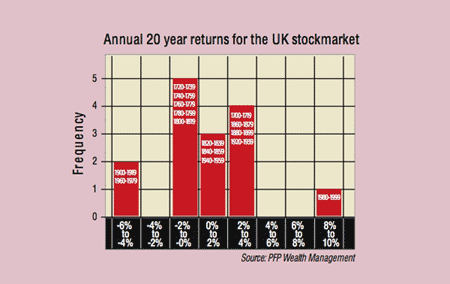Get the latest financial news, insights and expert analysis from our award-winning MoneyWeek team, to help you understand what really matters when it comes to your finances.
You are now subscribed
Your newsletter sign-up was successful
Want to add more newsletters?

Twice daily
MoneyWeek
Get the latest financial news, insights and expert analysis from our award-winning MoneyWeek team, to help you understand what really matters when it comes to your finances.

Four times a week
Look After My Bills
Sign up to our free money-saving newsletter, filled with the latest news and expert advice to help you find the best tips and deals for managing your bills. Start saving today!
It's not just double-dips and deflation that equity investors have to worry about, according to Citigroup's global equity strategist Robert Buckland. Western stockmarkets face a longer-term headwind: the end of the "cult of equity" that bolstered markets in the late 20th century and its gradual replacement with "the cult of the bond".
There has been a "profound reassessment of the merits of the two asset classes" by institutional and retail investors, says Buckland. In Britain, pension funds piled into equities from the early 1960s onwards. By the early 1990s they held 76% of assets in stocks versus just 12% in bonds. Now, following a sharp slide in equity weightings over the past ten years, the proportions are roughly equal at 40%, as they were in the early 1960s. It's a similar story in America.
Inflows into US equity funds rose steadily until 2000, when they peaked. They made a small comeback in subsequent years but have yet to recover from the 2007-2009 market slide. European fund inflows never recovered from the 2000-2003 slide.
MoneyWeek
Subscribe to MoneyWeek today and get your first six magazine issues absolutely FREE

Sign up to Money Morning
Don't miss the latest investment and personal finances news, market analysis, plus money-saving tips with our free twice-daily newsletter
Don't miss the latest investment and personal finances news, market analysis, plus money-saving tips with our free twice-daily newsletter
So why the shift? One reason is that with deflation now deemed the main threat, bonds are more popular. Pension funds have increasingly gone for the safer option of bonds as populations are ageing. But the key reason is recent performance. "Dreadful returns are increasingly putting investors off equities," says Buckland. Global stocks are up just 4% since 1999. And "having two 50% bear markets in a decade is enough" to rattle "the most determined equity cultist". It doesn't help that investors were spoiled by the freakishly good returns in the 1980s and 1990s, as Tim Price of PFP Wealth Management points out (see chart above). This helped cement the cult of equities. Meanwhile, global government bonds have returned 103% since 2000.

If we are indeed seeing the end of the equity cult, there is an upside for stock investors. Dividends are the key to long-term returns (see right). As stocks have fallen from favour and bonds have become more popular, dividend yields in most Western markets have eclipsed bond yields. That, as Buttonwood points out in The Economist, means that even if dividends turn out to be stagnant for the next decade, equities still offer a higher income than government bonds. What's more, if inflation does take off, dividends would increase while "bonds would look horribly overpriced".
Get the latest financial news, insights and expert analysis from our award-winning MoneyWeek team, to help you understand what really matters when it comes to your finances.
MoneyWeek is written by a team of experienced and award-winning journalists, plus expert columnists. As well as daily digital news and features, MoneyWeek also publishes a weekly magazine, covering investing and personal finance. From share tips, pensions, gold to practical investment tips - we provide a round-up to help you make money and keep it.
-
 How to navigate the inheritance tax paperwork maze in nine clear steps
How to navigate the inheritance tax paperwork maze in nine clear stepsFamilies who cope best with inheritance tax (IHT) paperwork are those who plan ahead, say experts. We look at all documents you need to gather, regardless of whether you have an IHT bill to pay.
-
 Should you get financial advice when organising care for an elderly relative?
Should you get financial advice when organising care for an elderly relative?A tiny proportion of over 45s get help planning elderly relatives’ care – but is financial advice worth the cost?

